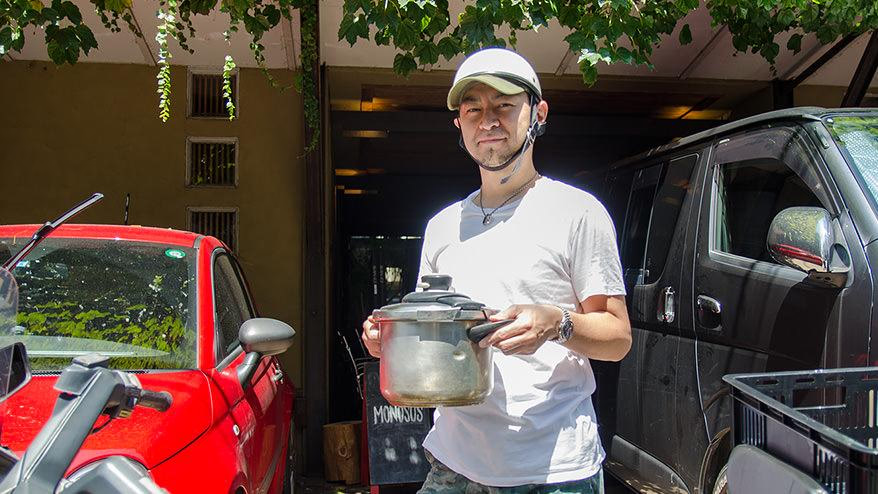モノサスで働くメンバーのランチタイムを支えてくれている週に2回の社食。2012年から毎週、おいしい社食を作り、届けてくれているのが、今回、登場していただく野中剛(のなか ごう)さんです。
ゴウさんがオーナーを勤め、代表の林との出会いの場となった原宿にあるBar dAZE(バー デイズ)でインタビューさせていただきました。
雨ニモマケズ
風ニモマケズ
夏ノ暑サニモマケズ
剛サンハバイクヲ走ラセ社食ヲ運ンデクル・・・
雨が降ってきたな・・・と心配していても、そんなことはお構いなしで大きな炊飯器やお味噌汁が入った鍋をバイクに乗せ、ゴウさんは颯爽とやってきます。
そして私たち社食委員にテキパキと指示を出すと、また颯爽と帰っていきます。
そうやってどんな時にも持ってきて下さる社食を、私は社食が始まった頃から約4年、ほぼ全て食べてきました。ゴウさんがたくさんもらったから!と桃を入れたカレーなど、家では作れないようなメニューもありました。
美味しい社食は、私のお腹周りのお肉を増やしただけでなく(笑)、普段話をしないような他部署の人との会話も増やしてくれました。
社食の日は会議室のテーブルで、部署関係なく皆で食べるからです。
美味しいお料理は会話を弾ませてもくれます。社食時に一度話すとその後のコミュニケーションはスムーズ、私に社食は欠かせません。今後社食が続く限り、私は食べ続けます!
なので、ゴウさん、
事故にはくれぐれも気を付けて、いつまでも元気に美味しい社食を作ってきてください。
いつも本当にありがとうございます!!!
(社食委員 大久保千賀子)
モノサスの社食を支えるゴウさん
超ダイジェスト版ヒストリー
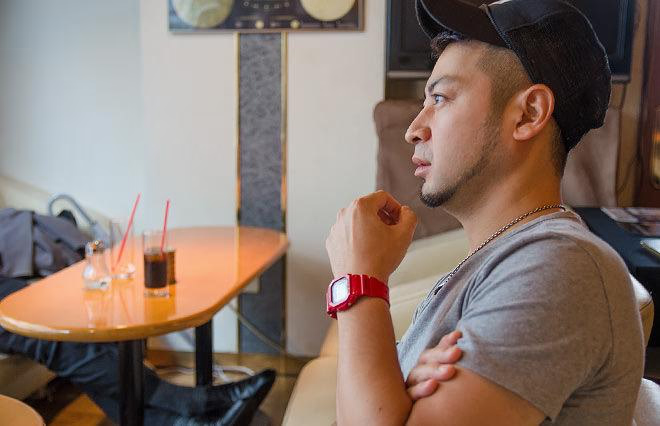
8年前にdAZEのオーナーとなったゴウさん。社食を届けてくださる姿、創立記念パーティでの颯爽としたバーテンダー姿が印象に残っている社員は多いものの、どんなバックグラウンドがあってゴウさんの今があるのか知らない人が大半だと思います。
そこで、dAZEを始める前の日々について質問すると、ゴウさんにっこり笑って「細かく話すと1日かかるから、超ダイジェスト版でいくね」と語り始めてくれました。
「高校卒業した後、当時の美容師の彼女と同じ火曜日休みがいいと探して入った会社が宝石店。ここがゴリゴリの電話営業をかける店だったんだけど、肌にあったのか、またたく間にトップ営業マンになり、23歳で独立したんだよね。
でも、1年半で潰してしまい、今度はイトコと携帯の店を始め、5店舗まで増やしたものの、折り合い悪く退社。
そこで、一旦全部やめようと決めて、後輩の家に転がり込み、夜は先輩の仕事先のバーでバーテンのアルバイトをしていた。
そのバーにはすごくいいスピーカーが置いてあって、その輸入代理店の社長さんがお客さんで来ていたわけ。それで、それまでの経緯を話すうち、『うちに来い』と言ってくれて、入社したのが前職のスピーカーの輸入代理店。
扱っていたのはコンサートツアー用のスピーカーで、小田和正さんのツアーに付いて全国を回り、地方のPA屋さんに営業かけるみたいな仕事をしていた」
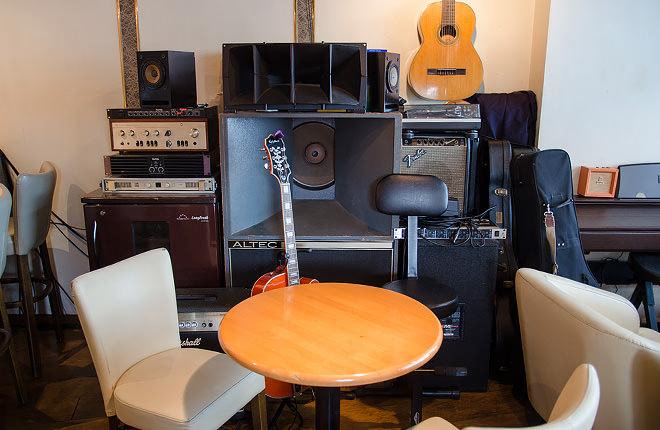
dAZEに設置されたスピーカーは、当時勤めていた会社で扱っていたもの
細部に溢れるドラマは割愛してのこの波瀾万丈。いくつものエピソードを詳しく聞きたい方は、ぜひ、dAZEのカウンター越しに話してみてください。
「その後、社内のゴタゴタに巻き込まれて退社することになり、副社長から紹介されたのが、この店で。1年目は雇われ店長兼バーテンダー。2年目に買い取って自分の店にしたのが8年前。偶然、近所に住んでいたモノサスの林さんが飲み来てくれたのもその頃です」
ゴウさんに誘われ、林が原宿界隈のバスケットボール・コミュニティに加わり、共にプレーするなど、オーナーと客以上のつながりを深めていったそうです。
「社食の話が出てきたのは、ちょうどうちもランチをやり始めた4年前くらい。林さんから『できる?』と聞かれて、やったことないけど『イエス』と。2つ返事でした。
音響の仕事をやっているとき、コンサート会場にケータリングサービスがよく来ていたから。なんとなくイメージはあったんだよね。食器類は常備しておいてもらって、寸胴に料理を入れて持って行き、移し替えはせずにそのまま温めれば効率的じゃないかなって」
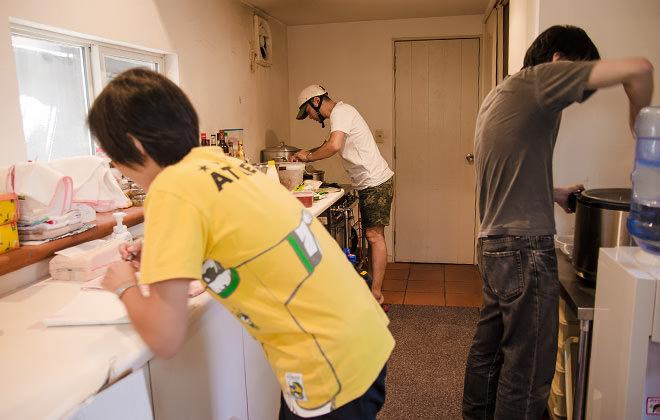
今回、林に社食を始めたいと思ったきっかけをあらためて聞いてみました。
モノサスでは、社食の前身として「カフェ・モノサス」という月に1回、林が腕をふるってみんなのランチをつくる会がありました。この頻度を上げ、もっと定期的にみんなで食卓を囲む制度をつくりたい。そう考えたのが、社食をお願いするキッカケだったそうです。
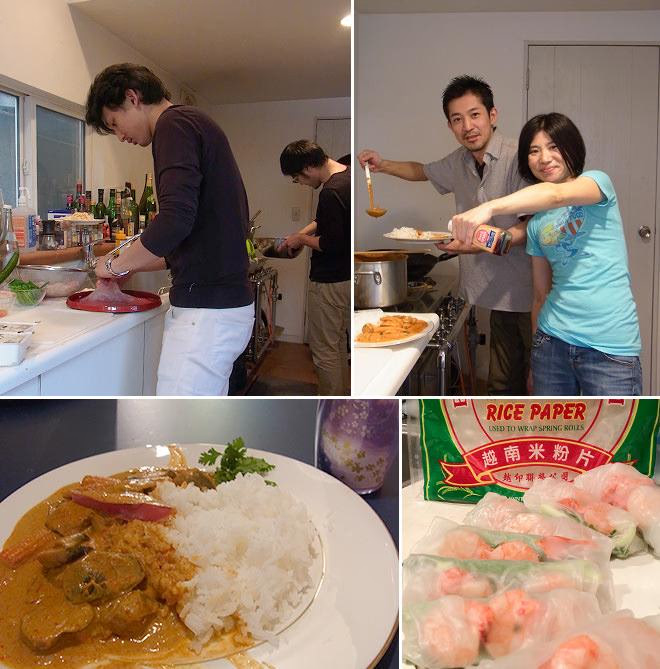
カフェ・モノサスの様子(2011~2012年)。月1回、林を中心に社員も参加してスタッフのまかないランチを作っていた。
自信のメニューはタコライス
ゴウさんとモノサスをつなぐ「社食ノート」
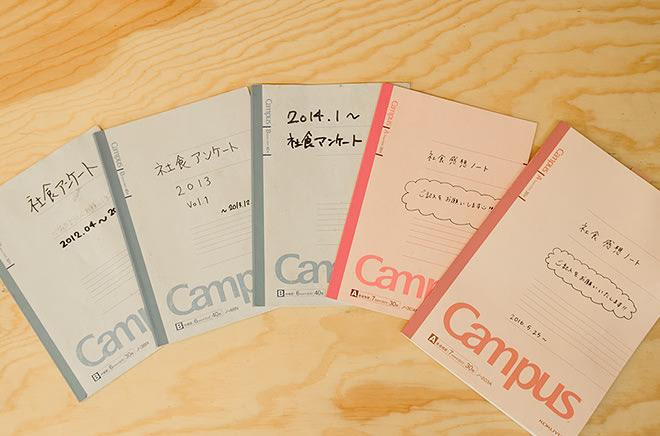
社食の感想を伝える社食ノート。2012年から続くこのノートは今ではもう5冊目。
「最初は週1回だったんで、正直、うちのランチのメニューをアレンジして持っていけばいいかなと思っていたんですよ。でも、1ヶ月くらいやってみたら、“毎週、カレーじゃまずいな……”と感じて、料理が得意なうちの奥さんに『メニュー、何かできない?』と相談してみたんですよ。
そしたら、いろいろと考えてくれて。みなさん一人暮らしの方も多いから、あんまり外食で出てこない煮物とか、実家のごはんのような感じのものを作ってくれています」
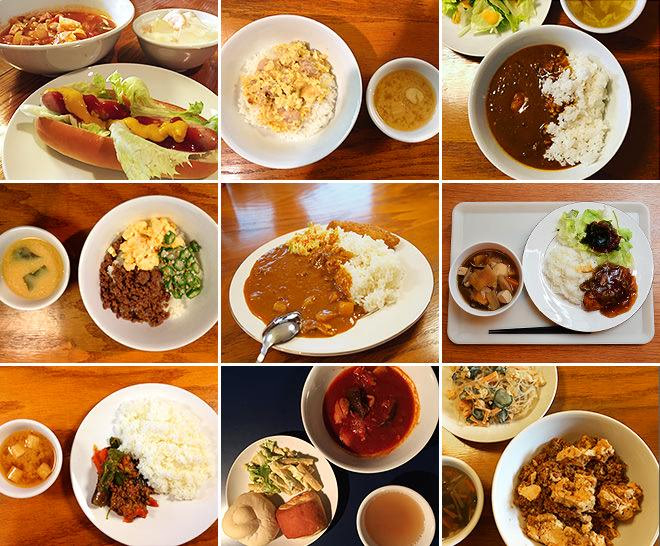
和洋中問わず、バラエティ豊かな社食のメニュー
ドンとメインが定まったゴウさんの日と、おふくろの味的なほっこりするメニューの並ぶ奥さんの日。社員も「今日は奥さんの方の日だね」とトンマナの違いを楽しんでいます。
「僕の自信のメニューはタコライス。店でも人気があって、普通はビーフだけど、うちは鳥のひき肉と醤油を使っています。最近、社食委員の人から評判が良かったのはけんちん汁。里芋がなくて、代わりにじゃがいもを使って慌てて作ったわりには、おいしくできた(笑)。
逆にだいぶ前にやっちゃったなと思ったのは、ざるそばとごはんという謎の組み合わせ。たぶん、究極にテンパっていて、蕎麦屋さんのランチをイメージしたものの、ごはんをかやくごはんにしたり、親子丼にする余力がなかったんだろうね。攻めすぎの組み合わせで、今でも“あれは、びっくりしました”と言われるもんね。失礼しました」
そんなゴウさんと社員をつなぐのが、メニューの感想やリクエストを書き込む社食ノートです。
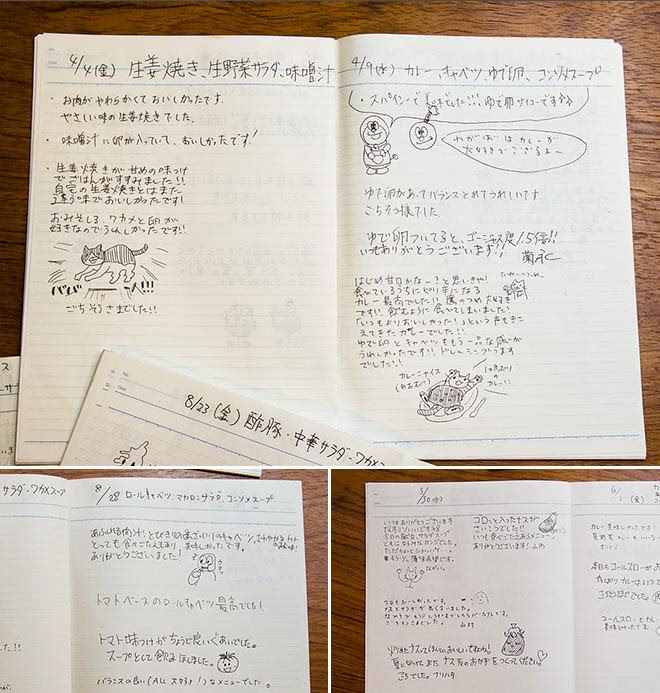
スタッフが思い思いに食後の感想を綴っている。イラスト付きの楽しいコメントも。
「特に奥さんはいつも“味付けがどうだったかな?”と気になっているみたいで。でも、俺も持って行った後、みんなが食べているところを見るわけじゃないでしょう。だから、社食ノートはすごく大事。あのノートに書かれているメッセージを見て、『作りがいがある』ってモチベーション上げてくれているから」
これは今後も積極的に書き込んでいきましょう!
出迎えてくれるから、行かなきゃ、と。
社食を今まで続けてこれた理由
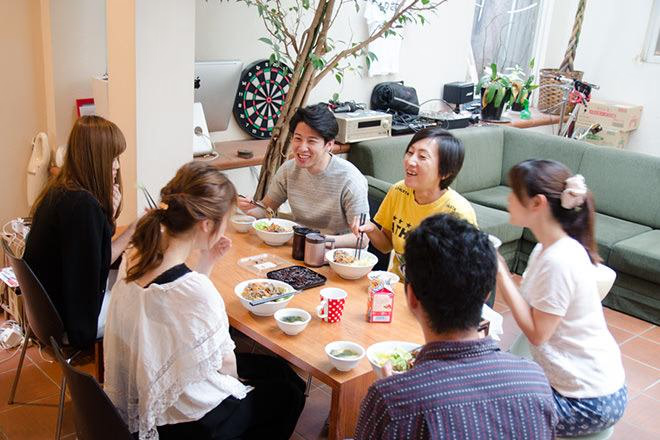
食卓を囲んで社食と会話を楽しむスタッフたち
「でも、じつは社食をやってきて一番記憶に残っているのは、メニューや料理のことじゃなくて、配達中に起きた圧力鍋並走事件なんだよね」
いつもバイクに寸胴や鍋を載せ、配達してくれるゴウさん。事件は代々木駅近くで起きたそうです。
「道路の段差でドンとなった瞬間に、圧力鍋がドスンと落ちちゃったんだよ。うわ、スープぶちまけた! と思ったら、バイクの横を圧力鍋がしゃーーーっと並走していた(笑)。
普通の鍋ならひっくり返っていたと思うんだけど、圧力鍋は底が厚くて重くて頑丈。だから、絶妙なバランスで着地して、慣性の法則? ともかくなんらかの力が働いてそのまま滑り出したんだろうね。
そのまま数メートル並走して、僕も鍋もスピードダウンしながら一緒に止まり、何事もなかったように回収。歩道で見ていたおばちゃんがびっくりしていたけど、そのままモノサスに。
さすがに当日、『落としちゃってさ』と打ち明けるのは無理だったけど、あのときのスープが無事だったのは、本当にインパクト大だった」
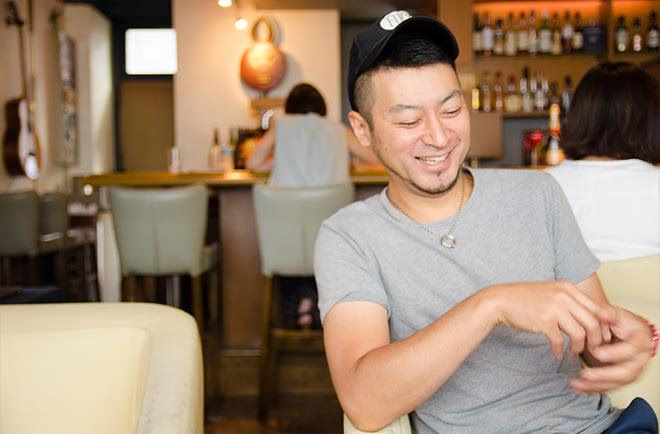
配達の裏に、そんなドラマが隠されていたとは……。
「だけど、モノサスはお世辞でもなんでもなく、いい空気だよね。圧力鍋事件の日にかぎらず、こっちは朝からランチと社食の準備と同時並行でやって殺伐しているわけだけど。モノサスに行くと『おはようございまーす』って、いい意味でほわっーとした感じの方たちが迎えてくれる。ここだけちょっと時間の流れ遅くない? みたいな感じでほっこりするもん。
また、わざわざ社食委員を設けてもらったのも続けてこられた要因の1つだよね。もし、配達を待っていてくれる社食委員さんがいなくて、僕が勝手に持って行って、置いて帰るだけの仕組みだったら、二日酔いでしんどいなって朝は休んでいたと思う。そういう休みが、月に1、2回あって社食も自然消滅していたかもしれない。
でも、社食委員の方が密にコミュニケーションを取ってくれて、出迎えてくれるから、行かなきゃ、と。今思ってみると、続ける上ですごく大きな要因になっていると思う」
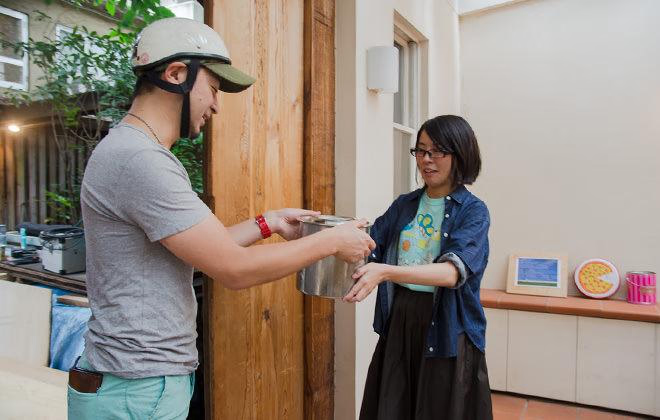
もはや仕組みがなかった頃が思い出せないくらい日常になっている社食制度。途中、週1回を週2回にしてもらい、作ってもらう量も20人前から25人前に増やしてもらうなど、より充実した内容となっています。
「ここでも社食委員の人たちの存在は大きいよね。週1回から2回への変更、作る量の増量、あと毎月のメニューの掲示。どれもいきなり『やってください』と言われたら厳しいんだけど、コミュニケーションの間合いが抜群に良くて、こっちが慣れてきた頃に『人数増やして』、『週2にして』、『メニュー出して』と声がかかる。意図してそうしてもらっているのかわからないですけど、作る側としてはありがたい。
また、3年間のやりとりを通してノウハウを蓄積させてもらったので、今後はケータリングを他の会社さん向けにも始めようかなと計画中。配達の人手も増やして勝負に出るかもしれません」
モノサスらしい、いい距離感で
これからもよろしくお願いします
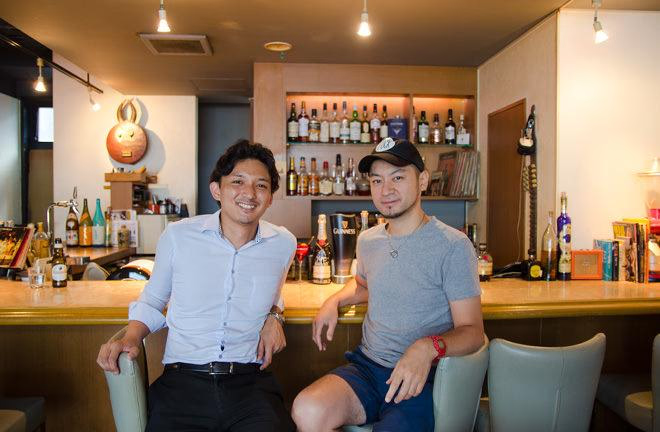
ゴウさんから電話があると10分で駆けつける?!常連の坂本(左)も取材に同行。ゴウさんとの2ショット。
去年の創立11周年記念パーティでは金曜日にもかかわらず、お店を閉めて参加してくださったゴウさん。
「出張バーテンダー。やりましたね。もう1年近く前になるのか。早いね。
たしかに、お店を閉めたは閉めたけど、22時くらいには戻って開けていたから。うちの夜の常連さんそれくらいからなんで、まあ、影響は全然…でもなかったか(笑)。『開いてなかったよ』とツッコまれつつも、『そういうときもあるわ! いつでも開いていると思うなよ』って言い返して、お客さんに恵まれているよね」
出張バーテンダーの依頼は社食委員から?
「林さんから電話で『できる?』って。だから、こっちも『はい』と二つ返事で。これまでもパーティへの出店は時々やっていたから。それこそ花火大会を見るプライベートな屋上でのパーティから、有名ブランドのレセプションパーティまで。音響、飲食をセットに引き受けているんだけど、だいたいこちらに丸投げが普通なんだよね。
しかも、当日になってみたら100人のお客さんに対してバーテンダーは僕だけ、トニックウォーターもソーダーも切れちゃいました……みたいなことザラにあるから。けっこう大変。でも、モノサスさんは別に僕らいなくてもいいんじゃない? と思うくらい周到に準備してくれて、当日は行って作るだけでいいというすばらしいオーガナイズでした」
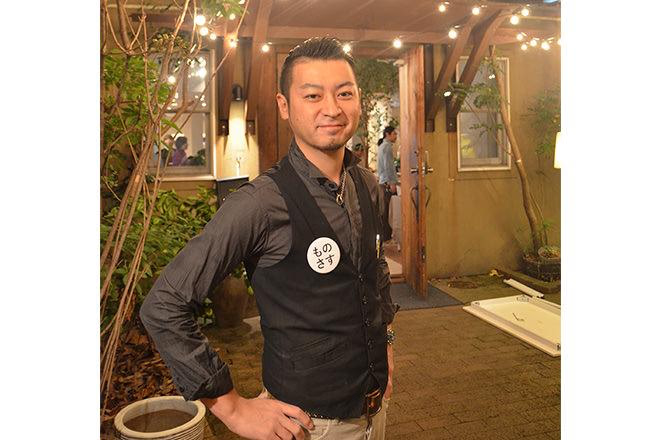
バー越しに創立記念パーティを見ていたゴウさん。会場の雰囲気が「とてもモノサスらしかった」と感想を聞かせてくれました。
「僕もモノサスさんとはかれこれ10年くらいの付き合いがあって、感慨深いものがあったし、ゲストに来ている人たちが見事にモノサスタッチというか。取引先と言いつつも、親戚か?みたいな距離感で、いわゆる殺伐した感じを一切受けない雰囲気だった。
バーテンダーをやっていても、ドリンクができるまでの間にみんなが喋りかけてくるんですよ。『どういうつながりなんですか?』って。でも、そのわずかな時間だと『社長の林さんが昔、来ていたバーの……』『今は社食もやっていて……』と説明しても伝わらず、みんな「?」マークを浮かべたまま、ドリンク受け取っていましたけど(笑)。
とにかくこれまで呼んでもらったイベントの中でも群を抜いていい空気でした。呼んでいただければ12周年もまた。今度は新たに加わってくれたスタッフの彼と2人で行きます。開店を遅くして(笑)」
ゴウさんの夜の顔
Bar dAZE でバーテンダーの心得を聞く
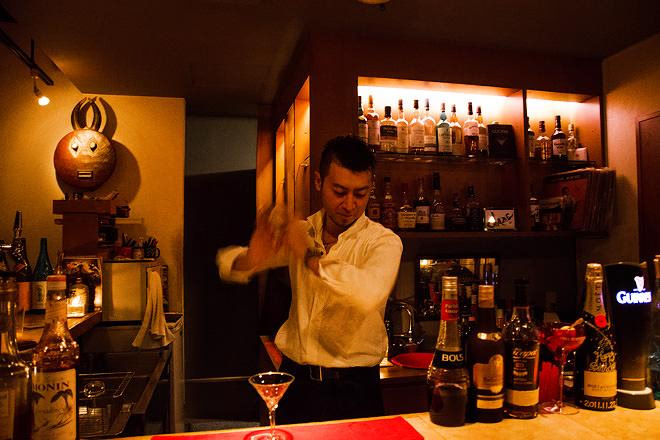
モノサスがなじみのある、社食を持ってきてくれるゴウさんの姿は、実は昼の顔。夜の顔は、キメキメないで立ちでオシャレなカクテルを作っているバーテンダーなんです。
夜の装いとなったゴウさんに、バーテンダーとしての心得を聞きました。
「初めてのお客さんが来てくれたとき、最初、俺は話しかけません。その人なりのリズム、飲みに来た意図があると思うので。俺も1人で飲みながらボトルと会話するみたいな夜もあるから。
だから、最初は見守って、おかわりをもらったら、初めて空間は受け入れられたんだなと思って「お近くなんですか?」とか話しかけていく」
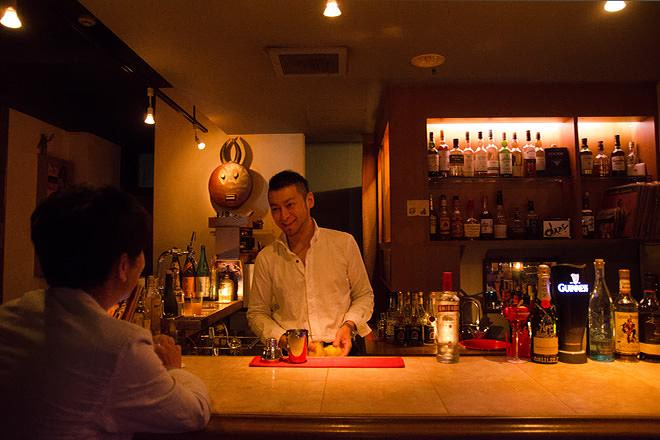
「バーって夜の心療内科と言われたりするんですけど、誰しも軽い気持ちの上げ下げがって、そこを整えに飲み来ているところもあるじゃないですか。
だから、来てくれた人をそのまま帰すのは嫌なので、話は聞くし、説教もするし、落ち込んでいるならテキーラ飲ませるなんて荒療治もするし、とにかく店に入ってきたときと出ていくときで何か変化してくれたらなって思ってる。
いかにお客さんの呼吸に合わせるか。かっこよく言うと、それが俺なりの仕事のこだわりかな」
いつも楽しい話をしてくれる明るいゴウさんですが、お客さんのリズムや呼吸に合わせて立ちふるまう…。細やかな心づかいが改めて素敵だなと思いました。
そんなゴウさんに話を聞いてもらいたい人、会いたい人はぜひ Bar dAZE へ!
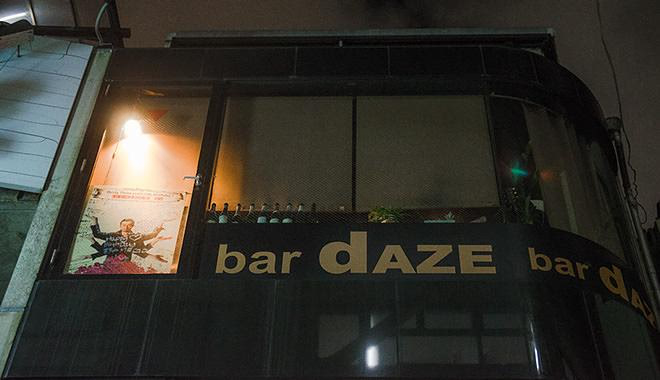
※原宿の奥まった路地を抜けたビルの3階にある Bar dAZE。画面左のポスターは、ゴウさんの33歳バースデーパーティーで作ったとのこと!
(インタビュー構成:佐口賢作)
Bar dAZE
東京都渋谷区神宮前3-27-17 T’s-TWOビル3階
tel 03-5412-0938
[月~土] 19:00~03:00 [日・祝] 19:00~01:00
夜10時以降入店可、夜12時以降入店可、日曜営業
Facebookページ
https://www.facebook.com/pages/Bar-Daze/214244975261109
